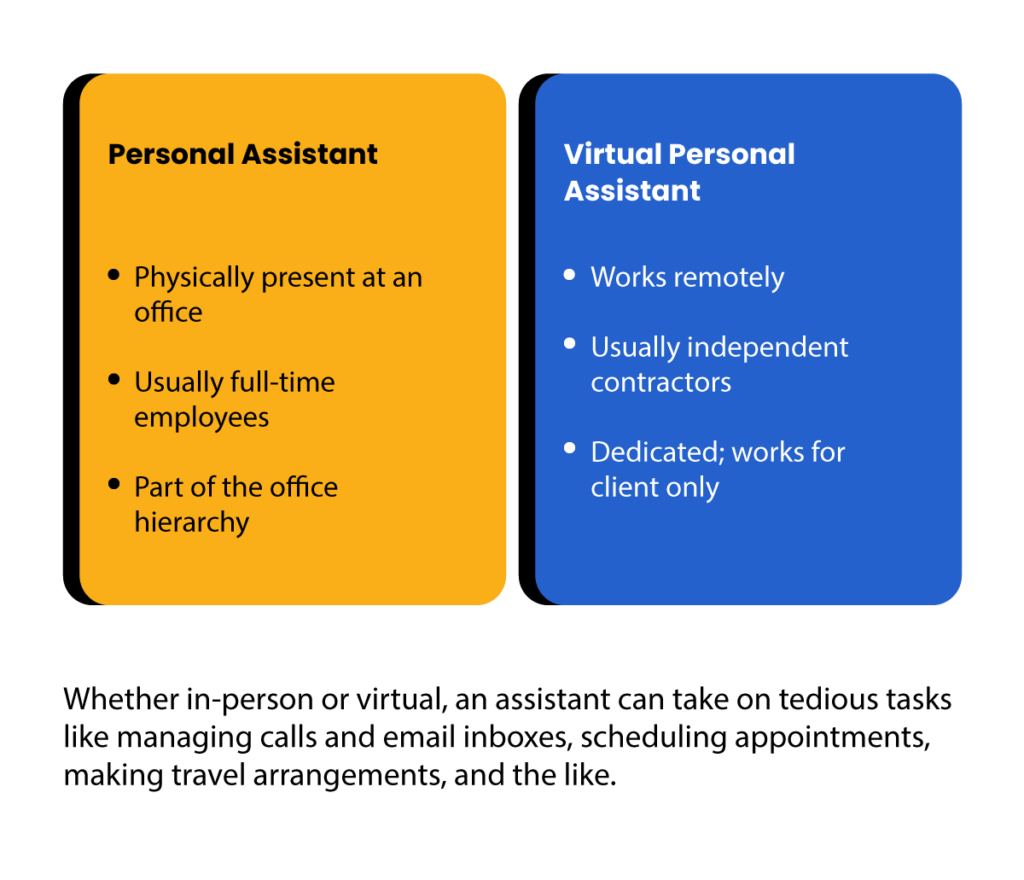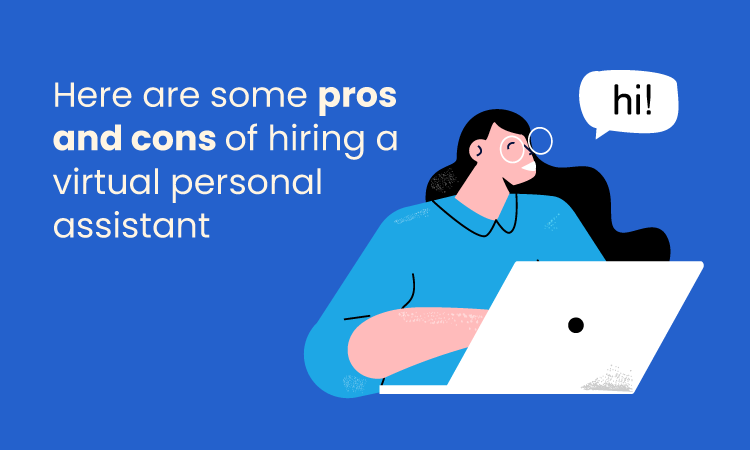Business professionals wear various hats, and attending to various aspects of a business can be very challenging at times. When a business grows, its owners would need to offload certain time-consuming yet necessary tasks, like content creation and bookkeeping. Virtual personal assistants are among the most reliable for these types of jobs.
Wing Assistant enables business owners to focus on the tasks that need their attention most. Our virtual personal assistants will take on personal errands and business tasks alike; from getting groceries delivered to managing your work calendar, Wing’s virtual PAs have your back. If you’re on the fence about hiring a virtual PA, no worries—our nifty guide should help you decide whether an in-person assistant or virtual assistant is for you!
In-Person vs Virtual Personal Assistant
While in-house personal assistants and virtual personal assistants both provide support to their clients, there are some key differences between the two.
The most obvious difference is that personal assistants are physically present with their clients while virtual assistants work remotely. Personal assistants can do things like purchase items at a physical location, do laundry, and take care of personal shopping. Virtual assistants can do all of these things, and more, but they do so remotely.
Another key difference is that personal assistants are usually employees of their clients while virtual assistants are independent contractors. This means that personal assistants are often paid a salary or hourly wage while virtual assistants are typically paid per project or task.
Finally, personal assistants often have a team of other personal assistants working underneath them while virtual assistant services are usually dedicated, with one VA working for one client.
What is a Virtual Personal Assistant?
Furthermore, when people talk about virtual assistants, they often use the terms “remote personal assistant” and “virtual personal assistant” interchangeably. While both of these types of personal assistants work remotely, there is a distinction between the two.
A remote personal assistant is an individual who provides administrative, secretarial, or personal assistance to a client who is not physically present. The assistant may be in a different city, state, or country. Remote PAs may be in-house employees, but ones who perform their duties away from the office.
Meanwhile, a virtual personal assistant is an independent contractor who provides administrative, secretarial, or personal assistance to clients via the internet.
Virtual personal assistants are often used by busy entrepreneurs, executives, and celebrities who need help with tasks but don’t have the time or resources to do everything themselves. VAs can do things like manage email inboxes, schedule appointments, make travel arrangements, and handle social media accounts.
Pros and Cons of Hiring a Personal Assistant
Personal assistants are more familiar to executives. Many high-powered professionals have a trusted aide or secretary who handles the day-to-day concerns of their office. More conservative executives might be inclined to hire a full-time employee instead of a virtual personal assistant, but is this always the best route for business leaders? Keep reading to learn more advantages and disadvantages to hiring a personal assistant.

Pro: Building Trust May Be Quicker
Personal assistants work in the office, so they have more opportunities to strike up informal conversations and establish rapport. Gaining their coworkers’ trust, then, becomes easier for PAs. Since an assistant’s skill in navigating social relationships contributes to their success, rapport building is a must for them.
Molding relationships with fellow assistants, with their manager, their manager’s teammates, and company higher-ups may take a shorter time for PAs who work at a physical office. There are plenty of opportunities to chat with people at their desk, in the hallway, or during office events, which are generally unavailable to assistants who work virtually.
It’s quite easy for an experienced PA to learn the “lay of the land” at an office and understand how they can best help their manager, given the context and office dynamics that they are entering. Speaking of context–
Pro: Fewer Things Need Explaining At The Start
There are several reasons why developing rapport is important. First, it allows for more effective communication. When you have a good relationship with someone, you’re more likely to be able to talk to them openly and honestly. This is important when you’re trying to give feedback or discuss difficult topics.
Second, a good relationship with your personal assistant can lead to a more productive work environment. When you trust and respect each other, you’re more likely to be able to work together efficiently. Finally, a strong rapport makes it easier to ask for help when you need it. Virtual personal assistants can develop that rapport with their clients, but it can take a while. If your VA is from a different culture, they might miss out on cultural nuances at your office.
An in-office assistant will be more aware of nuances in an office. Since PAs work at a physical location, they’ll likely share their employer’s cultural norms and values. They’ll more easily adapt to practices at the office, and would need fewer briefings on business practices.
In contrast, a virtual assistant may need some briefing on their employer’s expectations or practices, especially if they come from very different business cultures. That said, highly competent and emotionally intelligent VAs can be similarly attuned to office culture.
Neutral: By Default, They Work During Office Hours
A personal assistant typically works during business hours, from Mondays to Fridays. They usually go to a physical office for eight hours a day. A personal assistant’s availability is neither a pro nor a con. It depends on whether you need your assistant to work closely with you or prefer a hands-off approach.
If you’re the type of executive who relies on communicating as you go through the day, a personal assistant could be a good fit. Meanwhile, if you’re the type who prefers to work alone for long periods of time and sync up with others afterwards, consider getting a virtual personal assistant.
Since PAs work within the traditional 9 to 5 structure, they’ll only be able to read messages during regular business hours. If you have clients in other time zones, your PA will likely only respond after your client’s office hours. In contrast, you can choose the window of hours you’d like your virtual assistant to cover.
Con: Hiring a Full-time Employee is Expensive
Besides payroll and office equipment, employers must consider mandatory benefits and insurance. This includes things like paid leaves, contributions to retirement plans, federal and state unemployment, and more.
According to the December 2021 press release of the U.S. Bureau of Labor Statistics, the average cost of civilian compensation for U.S. workers for that month was $40.35 per hour. Of that figure, only $27.83 per hour was allocated to wages and salaries. The remaining $12.52 per hour went to benefits and supplemental pay.
Besides mandatory benefits and insurance, employers must pay for nonproduction bonuses like year-end, holiday, and attendance bonuses. Shift differentials, overtime pay, and other premium pay costs are also the responsibility of the employer. Hiring an in-office personal assistant means having to account for all of these costs, and more.
Con: Most In-Office Assistants Have a Limited Skillset
Finally, personal assistants often work on a limited number of tasks. If they are office administrators, they are likely to remain as such. In-office PAs don’t normally feel incentivized to learn new skills like social media management or graphic design.
Pros and Cons of Hiring a Virtual Personal Assistant
Virtual personal assistants, or VAs, are not yet as commonplace as in-office PAs. However, they are fast becoming mainstays in corporate culture. There are VAs working for businesses of all sizes, from startups and solo enterprises to Fortune 500 companies. Here are some things to keep in mind when you’re deciding whether you should hire a VA or not.
Pro: Virtual Assistants Follow Hours You Set
A virtual personal assistant can work for you, or they can work for your whole team. If you need them to cover hours outside of the conventional 9 to 5, you can set an agreement with them about it. This is especially helpful if you have clients in far away time zones.
You can have full-time VAs work their 8 hours during a window that overlaps with your clients’ business hours. This way, your VA can assist them immediately or provide answers to their questions even if you’re unavailable.
Other VAs work as needed, so their hours can be even more flexible to meet your demands. If you’re not sure what kind of schedule would work best for you, try out different arrangements with your VA and see what works best for everyone involved.
Pro: Virtual Personal Assistants Upskill All the Time
People who become VAs often do so as a career move, or by choice. So, they are more motivated to complete certifications and undergo continuing professional development. Even general virtual assistants pick up training in specializations like content marketing, graphic design, and social media management, to complement their existing skill set.
This way, they can provide more comprehensive support and be an even better asset to you and your business.
SaaS providers of business tools continuously update their offerings with new features. So, your VA needs to stay on top of these updates to ensure that they are using these tools correctly. This commitment to upskilling ensures that they always produce the best work possible for you.
Pro: Hiring a Virtual Assistant is Cost Effective
VAs only bill for hours worked, rather than accrued hours. In some instances, as in managed VA services, clients pay a flat monthly fee, often under $2,000 per month. Even if you hire a virtual assistant full-time, their fees will still be much more affordable than the total cost of hiring an in-house employee working the same number of hours.
You can also save on workplace costs by hiring a virtual personal assistant. You won’t need to provide them with office space, equipment, or software. And because they work remotely, there are no workplace distractions for them, which means they can focus solely on their tasks and get more done in less time.
VAs also provide more than administrative support. While personal assistants can do things like book travel and manage your calendar, VAs offer so much more. Some VAs are even trained to do complex tasks like social media marketing, lead generation, and website design and development.
If you need help with a task but don’t know how to delegate it, chances are there’s a VA out there who can do it.
Pro: Virtual PAs Can Handle What In-Person PAs Do
A virtual personal assistant can complete personal errands or to-dos remotely. Beyond inbox scheduling and travel planning, virtual PAs can also book your appointments, make dinner reservations, and track your fitness goals. You can even have a personal assistant shop for gifts online and have them wrapped and ready to go for special occasions.
While some tasks are better suited to an in-person personal assistant (like laundry), the majority of personal assistant tasks can be completed virtually. Hiring a virtual personal assistant is a cost-effective way to get the help you need without sacrificing quality or service.
Neutral: Virtual PAs Can Work Independently
Once you give instructions or brief virtual personal assistants on your processes, they will complete tasks without needing to check in with you about these. Most PAs are self-starting and will troubleshoot situations on their own before consulting their client. This allows you to focus on other tasks knowing that your request will be completed without interruption.
There are managed personal assistants who have a surrounding support team available to them. This can be particularly helpful if you have a complex business or plenty of personal commitments. With managed service providers, there is always someone available to help you with your needs. Even if your personal assistant has to take a day off, you’re sure that someone will step up and complete their tasks.
Neutral: You Still Need to Do Onboarding
Despite virtual PAs’ independence, clients still need to orient them on office procedures. It would also be helpful if PAs had a good understanding of client needs and goals. Your virtual personal assistant will produce output to the level of detail in your brief or your input at the start of the project. If they have a very good idea of what you expect from them, they’ll strive to meet the mark.
As their knowledge of your company’s ins and outs grows, their output will also get better. It will take them a shorter amount of time to produce results, and these outputs will also be of a higher quality than when they were just getting started.
Con: It Takes Time to Develop Rapport
Building a relationship with co-workers and subordinates is crucial in business success. Even if you’re working with a virtual personal assistant, you’d still need to build rapport with them. Since you’re working remotely, this might take longer.
Hiring a personal assistant: worth it
Business owners and SMBs benefit from having virtual personal assistants. There are many reasons to hire a personal assistant, but the pros listed above are some of the most important. If you are looking for someone to help you with your business or personal life, consider hiring a virtual assistant. They can help you boost your productivity, save you money, and provide peace of mind knowing that someone is available to help you with your needs.
Wing is shaping the future of work. We connect business owners to virtual assistants who can work on both business and personal tasks. Schedule a call today to learn more about Wing!
Aya is Wing Assistant’s blog manager. When she’s not wrangling content briefs, editing article drafts and handling on-page SEO, she is crafting messages for Wing’s other communication materials. Aya writes about SaaS startups, marketing for startups, search engine optimization, and pop culture.






